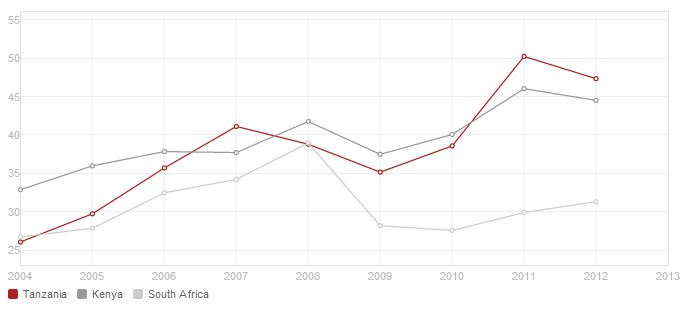Tanzania
United Republic of Tanzania's is an independent country with 47,8 million inhabitants in East Africa. The country is adjacent to DR Congo, Rwanda and Burundi to the west; Kenya and Uganda to the north; and Mozambique, Malawi and Zambia in the south. Dodoma is the capital of Tanzania but the largest previous capital city, with a population of 3,6 million people, is Dar es Salaam and has still the most economic and political influence throughout the whole nation.
Tanzania is a republic with a federal structure (Tanganyika and Zanzibar). The president is elected for five years and only renewable once. The First Vice President is the Prime Minister of Zanzibar; the second vice president is the Prime Minister of the Federal Government. The parliament, the National Assembly has 156 members: 101 elected on the mainland and 55 in Zanzibar and Pemba.
Economy - background
Chama Cha Mapinduzi (CCM) was, until 1992, the only political party allowed. The CCM held clearly a monopoly and most of the officials were also members of the party. The National Executive Committee had the power, there was no freedom of the press, and the Tanzanian economy was a centrally planned economy. However in 1992, a multiparty system and a free market economy were introduced. The currency in Tanzania is the Tanzanian shilling (TZS).
Due to this centrally planned economy the export got behind in comparison with neighbour country Kenya. The government is still cautious, followed with restrictions of exporting goods and services to the rest of the world. However, Tanzania has not reached their export potential and the organisation of IBUTTI, led by Deogratias Mbona, tries to support small and middle sized Tanzanian companies. To domestic, regional and global markets.
Economy - today
Currency: Tanzanian shilling (TZS)
GDP: $73.5 billion (2012)
GDP growth: 6.5% (2012)
GDP per capita: $1,700 (2012)
GDP by sector: agriculture (26.6%), industry (22.6%), services (50.8%) (2009)
Population below poverty line: 30% (2010)
Labour force: 24.7 million (2012)
Labour force by occupation: agriculture (65%), industry and services (35%) (2012)
Main industries agricultural processing products:
- sugar;
- beer;
- cigarettes;
- sisal twine;
- diamond, gold and iron mining;
- soda ash;
- oil refining;
- shoes;
- cement;
- apparel;
- wood products;
- fertilizer and salt.
Involved into the export sector are the government, private sector, individuals, enterprises, donors, and everyone who wants to expand Tanzania's export level and capacity.
Source: African Union World Trade Organisation
Percentage of the GDP by export of goods and services:

Percentage of the GDP by import of goods and services:

Conclusion: in the bar chart below you can see that the value of import of goods and services is higher than the export value. This automatically means that more money is getting out the country then money is coming in. Except loans and investments off course.
Further notice: imports/exports of goods and services represent the value of all goods and other market services received from the rest of the world. They include the value of merchandise, freight, insurance, transport, travel, royalties, license fees, and other services, such as communication, construction, financial, information, business, personal, and government services. They exclude compensation of employees and investment income (formerly called factor services) and transfer payments.
Source: Data Worldbank
Always the latest international and national trade market updates?
Subscribe for newsletter!
International Business and Trade Tanzania Initiative / P.O Box 35815 Dar es Salaam / info@ibutti.co.tz
Export training Workshop for food processors IBUTTI is organising a three-day export training workshop for food processors. The main objective of the workshop is to create awareness to participants about global markets and various opportunities availabe to them. The three-day workshop which will be conducted at a venue to be specified later, targets of producers of food products including maize floor, soft drinks, processors and semi-processors of fruits and vegetables etc. | ||
TMT for Capacity Building Eight IBUTTI's export training experts are participating in a course within the framework of the Nuffic project 29 TMT TZA: Capacity Building Course for Export Training Trainers. | IBUTTI Consultancy IBUTTI advices, promotes and facilitates the development of Tanzanian export trade. We research into investment, market linkages, industrial development and export of products and services. | |
Upcoming events
Workshop for food processors
Export training:
Furniture and forestry products
Export training:
Handcraft products
Export training:
Fruits and vegetable
Disclaimer:
All the content is for informational purposes only! IBUTTI makes no representation of accuracy and completeness. IBUTTI will not be liable for any errors on this site. IBUTTI will not be liable for any losses, injuries or damages from the display or information. The terms and conditions are subject to change at any given time, without notice. For more details, please contact us.
E-mail: info@ibutti.co.tz